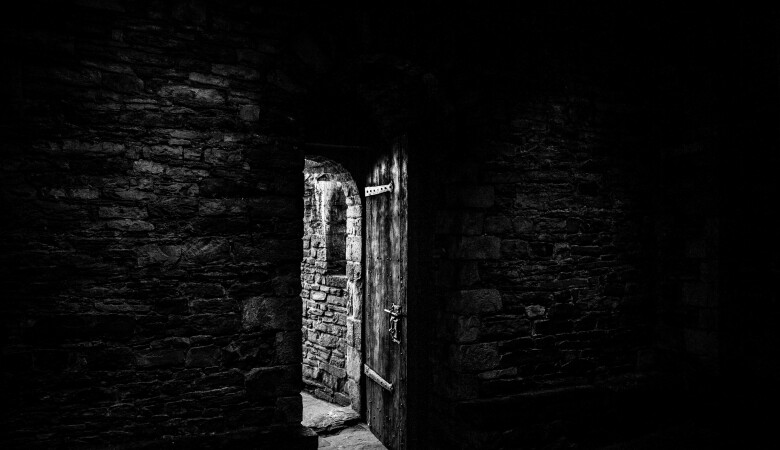Series: Mark
Jesus Wields the Sharp Sword of Rebuke (Mark Sermon 44)
March 05, 2023 | Andy Davis
Mark 9:14-32
Faith, The Power of Sin, Exaltation of Christ, Demons
Pastor Andy Davis expounds on three themes woven together in Mark 9:14-32: the vicious demon, the various degrees of people's unbelief, and the glory of Christ.
- SERMON TRANSCRIPT -
Turn in your Bibles to Mark chapter 9. I know some of you can scarcely believe we're going to do 14 through 32 today. You're like, I thought we were the church that spent whole sermons on one verse. But not today. We're going to move faster. But it's a marvelous narrative and account we're going to move through. One of the most remarkable pictures of Jesus in the Bible is in Revelation 1, where the beloved and aged apostle John saw the glorified resurrected Christ with eyes of blazing fire and feet of burn bronze, and it says, "with a sharp, double-edged sword coming out of His mouth."
Now that phrase double-edged sword should bring to our mind another text, Hebrews 4:12 which says, "The word of God is living and active, sharper than any double-edged sword." It divides, it penetrates, it divides soul and spirit, joints and marrow judges the thoughts and attitudes of our hearts. We have this concept of a double-edged sword coming out of Jesus' mouth. Swords are designed to sever, to separate. It's what they do. This double-edged sword comes out and in our text today, we're going to see Jesus wielding the double-edged sword of rebuke. He rebukes the demon clearly in verse 25, the text says, “He rebuked the demon and he left.” So in that way, the double-edged sword comes out of Jesus' mouth, severing the connection between the demon and the young man. But the text does not speak of the other rebuke that He gives so very powerfully to His disciples. The text doesn't call it a rebuke, but that's what it is.
In Matthew’s account, "Oh, unbelieving and perverse generation, how long shall I stay with you? How long shall I put up with you?" It’s very heavy what He speaks to His apostles. We're told in 2 Timothy 2, the word of God is God-breathed. All scriptures God-breathed and useful. Useful for what? For teaching. What's next? Rebuking? Correcting, training and righteousness, so that the man of God may be thoroughly equipped for every good word. So the conception I have of that double-edged sword coming out of Jesus' mouth is a sword to destroy His enemies as He is the king of the kingdom of heaven. He is the mighty ruling conquering king of Revelation 19 who comes back, and the sword comes out of His mouth and He kills people. He just destroys His enemies and destroys demonic power. The sword coming out of His mouth is like a weapon against His enemies.
But Jesus is also portrayed and again and again, we see this in His healings, as a great physician. In that sense, the sword comes out of His mouth as a scalpel to heal His people of the tumors that are besetting their souls, or we could say severing the invisible chains that are wrapped around our souls. All of you came in here, I came in here today, with invisible bonds wrapped around our souls that Satan has in his deceptiveness, woven around our souls and manifesting themselves in our lives, and those need to be severed. We need to be set free from indwelling sin and Jesus, the great physician can do it, but it's not a painless process. Sometimes He has to hurt us in order to heal us. The image I have today is all of us just need to lay on the operating table under His sharp double-edged scalpel and be rebuked by Him. Rebuked from what? Fundamentally in the text, it's going to be unbelief, our unbelief, which in Matthew’s Gospel He calls perverse.
I never thought of myself as a perverse person, but there is something fundamentally perverse about not believing in Jesus. We're going to find in our text, Jesus does not coddle or isn't comfortable with unbelief ever. He's never nice to it. He doesn't speak gently to unbelief. He always rebukes it. He deals with it very forcefully and directly. But in the middle of that, we have this father, one of the most pitiable characters in the Bible along with his son, his oppressed son, saying on behalf of all of us, thank God for it, "Lord, I do believe, help my unbelief." How many of you feel you could say that to him today? I feel all of us could. I think it's a prayer we could pray all the time to Jesus. So that's the text that's in front of us today. “Lord, I believe. Help my unbelief.”
I. One Main Goal, Three Themes, and a Perfect Narrative
In this text today, this account, we have one main goal. We're going to see one main goal that should not be a surprise to us. There'll be three themes serving that one main goal. And to that end, those three themes woven together in a perfect narrative that I want to honor. I want to honor the narrative. I want to walk through the narrative, but then I want to unravel the themes to achieve that one main goal. This is not just another exorcism, it's not just another healing account. First of all, how could there be just another exorcism? How are the exorcisms you saw this week? Were they amazing? I mean this is not... There is no such thing as just another exorcism. This is a miracle, a mighty miracle.
But even in the four Gospels, this has unique elements and it's worthy of our careful study. Now in this account, Jesus is going to be confronting two basic enemies, a demon who is revealed as uniquely vicious, and then varying levels of unbelief on the part of different people in the account. He's against the demon, He's going to fight the demon, and He is against the unbelief in the various people He's addressing. The one main goal is the same in all four Gospels, is indeed the same every week as I get up to preach, there is one main overarching goal of the four gospels, I would argue of the entire Bible, 66 books of the Bible, but specifically the four Gospels, Matthew, Mark, Luke, and John. For us specifically in the Gospel of Mark, that account, it is to bring us to a living faith in Jesus for the salvation of our souls from sin. That's the point of the Bible. That's the point of all four Gospels.
The theme of Mark's Gospel is asserted right from the very first verse, Mark 1:1, “The beginning of the gospel of Jesus Christ, the son of God,” that you would come to the faith that Jesus is the son of God and you would have a greater, more detailed, more majestic understanding of what that means. Then at the end of the Gospel of Mark, as Jesus has just died, and the centurion speaks in a summary sort of way for all of us, "Truly this man was the son of God." That brackets the entire 15 chapters up to that point in the Gospel of Mark or as Peter confessed as recorded in Matthew's gospel, "You are the Christ, the son of the living God,” that we would be able to make that confession from our hearts." You Jesus are the Christ, the Son of the living God.
And again, the purpose statement in John's gospel, John 20:31, "These are written that you may believe that Jesus is the Christ, the son of God and that by believing may have life in His name." That's the point of the whole Bible, I think. So every account in every Gospel is written to serve this one main goal to produce faith in Jesus Christ. How does it do that? It does it by giving us Jesus' credentials for such a lofty claim. His mighty words, His mighty works, His perfect character. Every statement serves that end, it's going to give us His credentials, His power, His nature, His compassion, His love, His unique identity as the incarnate God man, credentials, as the basis of our faith in Jesus.
Second, it's also going to address the readers. It's going to reach out to us as the readers where we're at and address our condition and seek to win us from varying levels of unbelief into belief in Christ. The gospels then frequently exemplify unbelief. They put unbelief on display so we can see ourselves in it, so that the word of God becomes a mirror. This is what unbelief looks like. Just to tell you where we're going, we're going to see unbelief in this account expressed in prayerlessness. If I were to ask any of you to say how many of you could be convicted on that count, that you show self-reliance through prayerlessness. That's a form of perverse unbelief. You're like, wait a minute, I didn't know it was perverse. It is. Jesus thinks it is. For you to be self-reliant and therefore think, I got this, I got this and don't need to pray about it. Is that you, it's me. We need to be weened off of that and learn to pray without ceasing, to not think that anything is too little to bring the God in prayer. That's where this sermon is going. Does that make sense?
"The gospels then frequently exemplify unbelief. They put unbelief on display so we can see ourselves in it, so that the word of God becomes a mirror."
That's what the apostles did. The demon possessed young man came and they thought, “We got this”, and they relied on themselves and their technique and their experience. I believe, and I'm going to argue this, that God the Father threw them under the bus for their own good. He knew what they wanted. He knew what they were trying to do. He would not do it. Jesus was not there. He is up on the Mount of Transfiguration and God the Father let them twist in the breeze. Why? Because we needed the help. They needed it. That what is going on. The idea here is that we would be won to a greater, more mature, more developed faith in Christ, and faith is the eyesight of the soul. We're going to see Jesus as He really is. That's what's going to happen in this narrative. The three themes are the demon, the faith of the people and the glory of Christ, His attributes, how He behaves here, what He shows about himself here. Those are the three themes.
So first theme, number one, is the demon; it’s vicious nature and it's chronic reign of terror over this young man and his loving father. That's theme number one. Theme number two is the faith of the people surrounding this case. Actually their unbelief, their varying levels of unbelief. There is no person in this account whose faith is exemplary. No one displays exemplary faith here. Rather, there are varying levels of unbelief. First the crowd, we have the crowd, they come in at the beginning. It's the group of people who are not defined or described here at all. They're just there. They're always there, the crowd. They are the ones from whom Jesus is trying to win His elect sheep. Out of that crowd, people who will cross over from death to light. They're at the level of unbelief. Some of them may be already believers, but that's the crowd. Their spiritual condition is not described, but they're mentioned. They're mentioned at the beginning of the account, and then they come flooding in right before the miracle. When Jesus sees them coming, He does the miracle.
Second, you've got Jesus' enemies, teachers of the laws, one translation “of the scribes”. We already know what they think. They've told us what they think. They think that Jesus does exorcisms by Beelzebub above the prince of demons. That's their official judgment. Remember how Jesus warn them about blasphemy against the Spirit that would never be forgiven, not in this age or in the age to come. They've already decided that Jesus does miracles by the power of Satan. In John 9, they've already decided that anyone who said that Jesus is the Messiah will be thrown out of the synagogue. They're the enemies.
Third, you got Jesus' nine apostles that were down below while the three apostles, Peter, James, and John were up on the Mount of Transfiguration, the nine apostles. Jesus is utterly exasperated with them and rebukes them as we'll see in this account. Then you've got the father of this young man who has enough faith to be there for the healing, but his faith has taken a major hit because of the apostle's failure. He's at the point now where he doesn't know what to think about Jesus. Those are the individuals we're going to look at.
Then theme number three, the great theme is the glory, the glories of Christ, His character, His words, His actions, His response to unbelief, rebuking it to heal it, His compassion on the father and the young man, His infinite power, especially in His openly claiming omnipotence, all things are possible for him who believes. It’s an incredible claim. A small display of that power effortlessly driving out this demon instantly and effortlessly.
Dealing also with the wisdom of Christ and dealing with His apostles' unbelief as they come to Him privately later and say, what happened? How did we fail? Then dealing with them. Then at the end, the extra paragraph that I added on, the Christ glory, which He's getting them ready again and again for, His death on the cross and His resurrection. He's getting them ready for what they are not ready for, how Peter keeps pushing against it. That's the whole account.
Now, these themes, the demon, the people's unbelief and the glories of Christ are woven together through this account. They're woven together like a tapestry. What I want to do is I want to honor the account as the Holy Spirit has given it to us and just walk from A to Z , first making comments along the way. Secondly, I'm going to pull out these themes and talk about them and then apply it. So that's what we're doing in the sermon. The account starts. They're coming down off the perfect mountaintop experience, the Mount of Transfiguration. Wouldn't you love to have been there? A foresight of Jesus' heavenly glory, the radiance, the brilliant light, all of that, but now it's time to get back to work. He's got to come down off that mountaintop. “No Peter, we're not building three shelters, we're not staying up there. We have work to do.” He has to come down off that mountain and He comes down into this big argument going on.
Jesus come down off that Mountain of Transfiguration to continue His journey to the cross. That's where He's going. He sees the nine apostles that He left behind arguing with the teachers of the law while the crowds listening to the argument. The crowd sees Jesus and are said to be overwhelmed with wonder. It's a very strong expression. They're stunned to see him. We don't know why, it doesn't say, but it's likely they have been desperately searching for Jesus and He's not around. They're wondering where He is. Here are the nine apostles. Where's Jesus? Now they see Him, and they run to Him. Jesus begins by asking the apostles that He left behind, “What were you arguing with them about?” They're arguing with these scribes, the teachers of the law, and the father speaks up and we get the first part of this tragic story ,and it is really tragic. Verse 17, “Teacher, ‘I brought you my son who is possessed by a spirit that has robbed him of speech." Whenever it seizes him, it throws him to the ground. He foams at the mouth, mashes his teeth and becomes rigid.” It's like he has epileptic seizures or something like that. But you can see the physical effects of this. "I asked your disciples to drive out the spirit, but they could not." The father gives this narrative in verse 17 and 18. The demons overpowering viciousness is first opened up here. More on that in a moment. Jesus doesn't focus on that enemy, the demon, but He zeroes in on a far more significant enemy and that is the unbelief on the part of His apostles. That's the greater danger here. Why is that? Why is unbelief such a great concern for him? Because everything that Jesus does is to produce faith in the hearts of His people so that they can be saved from their sins.“For it is by grace, you have been saved, through faith and this not of yourselves, it's the gift of God.” He wants to give us salvation from our sins through our faith in Jesus and no other way. Unbelief is the enemy.
Jesus reacts with a powerful rebuke concerning His apostles who failed to drive out the demon, and thus severely wound the faith of this man and almost certainly many in the onlooking crowd. Verse 19, "Oh, unbelieving generation." Jesus replied, "How long shall I stay with you? How long shall I put up with you?" I think this is definitely the sharpest rebuke Jesus ever gave to the twelve. As I think about Matthew, Mark, Luke, and John, I think this is the sharpest rebuke. He's generally very gentle with them, dealing with them, but this is... It's very strong, this rebuke. Then Jesus ordered, “bring the boy here to me.” Behind that you get absolute certainty that Jesus will be able to handle this situation. Don't you? Absolute certainty. “Bring him here.”
There is no problem with the demon at all. He'll handle that. They brought the demon-possessed boy to Jesus, and immediately the demon threw the boy down in the ground in a convulsion. He is dominating this tragic young man and his helplessly grieving father. The young man rolls around on the ground, foaming at the mouth. Then Jesus does something unusual. He asks for the medical history of this young man. How long has he been like this? It's fascinating because Jesus doesn't usually do that. He just heals people. He didn't ask the leper, how long has he been leprous? He just heals them. He doesn't need that information. He doesn't need... He knows everything, everything He needs to know and He knows all things and so He doesn't need that. So why does He ask? I think He asks so that we might have a sense of the greatness of the tragedy that's been going on, the magnitude of the emotion that Jesus is stepping into, and also therefore the greatness of the miracle He's about to do.
We're not very naturally compassionate. We don't generally care. We're like the priest and Levi in the Parable of the Good Samaritan, walking right by people, bleeding by the side of the road. We generally don't care, but the Holy Spirit wants us to care and He brings us into the situation. Do you understand what this has been like? So He asked for the history. The father answers, "From childhood." Now you have to walk into that and try to understand what that answer means, from childhood. It means that this young man's not a boy anymore. He's not a child anymore, he’s a young man. That means this has been going on for years, for years and years. I can scarcely imagine. Then He asks if the demon has often thrown the boy into the fire or the water to kill him. Often. So we're going to walk back through this to understand the viciousness of the demon, but I'm just going through the account right now.
Then the father exposes his own level of unbelief. “But if you can do anything, take pity on us and help us.” Have compassion and help us. See how this poor man's faith has been wounded by the failure of the apostles. It's not a minor deal when we mess up. He had come there expecting Jesus could help. Now he's not so sure. Jesus then uses, I think, a gentler rebuke on the Father. He's just a great physician. He knows what each person needs. So He repeats it, “If you can?” I think that's the right way to read it. "If you can? Everything is possible for him who believes." Do you realize the significance of that statement? It's incredible and we're going to dive into that in due time. But it's amazing. Then the father gives what I've already said is a timeless answer. You want to hold onto it for the future, like tomorrow's quiet time or maybe later today. "Lord, I do believe, help my unbelief."
Jesus then sees the crowd coming together, running to the scene. There's already a crowd. Now there's lots more people coming because Jesus is back from the Mount of Transfiguration, and they're running there. From that crowd Jesus is going to seek to gather His sheep through faith. It is for their sake and for the countless millions, tens of millions, hundreds of millions crowding around this scene through the scripture in the centuries that would follow. It's for our benefit that Jesus does this miracle. When He sees the crowd, verse 25, He rebuked the evil spirit. That's the one use of the word “rebuke” in the account. "He rebuked the evil spirit, ‘You deaf and mute spirit.’" Now we understand it's not just mute, but he's made this young man deaf. "You deaf and mute spirit." He said, ‘I command you come out of him and never enter him again.'" The latter part of that command I find to be unique. There's no other restraint like it in the Gospels, Matthew, Mark, Luke, and John. I'm going to talk more about that in a minute or so. But that particular demon is forbidden from ever tormenting this young man in that manner again, as though that young man and his father and that family have suffered enough from this. It's enough.
That part of the account ends with the disciples asking Jesus privately why they had failed. You can understand why they did it privately. They didn't want to do it in front of the crowd. They go to him later, like in the house or something like that. Say, what happened? Why couldn't we drive it out? Keep in mind that Jesus specifically earlier had given the twelve apostles this power over demons. That's key to understanding the rebuke. Mark 3:14-15, “He appointed twelve, designating them apostles that they might be with him and that He might send them out to preach and have authority to drive out demons.” There it is. He gave them that authority and they did. They went out and did it. Mark 6:13, “They drove out many demons and anointed many sick people with oil and healed them.” So Jesus answers their query, why couldn't we drive it out? In Mark's Gospel, it says, "This kind can only come out by prayer." What does that tell you? It means they didn't pray. Is that significant? Oh, yes, it is. God found it significant. What was going on there as they tried to do the exorcism? They were relying on themselves. This is the “We got this” thing. “All right, I got this. I know what to do.” They were relying on their own experience, their own knowledge, their own strength, their own expertise. Could I say their own technique, and the demon refused to come out. God, the Father did not do anything on their behalf.
Then the final section of today's sermon is that paragraph that I've added in which Jesus warns them again, what's about to happen and tells them not to tell anyone. He warns them because He's training them, specifically the apostles, getting them ready for the cross. He's going to be betrayed, He's going to suffer, He's going to die and He's going to rise again. But they didn't understand.
II. Jesus Rebukes A Vicious Demon
Now we have honored the account as the Holy Spirit gave us in Mark's Gospel. Let's walk through it. I want to pull out the themes. Let's talk first about this demon. Jesus rebukes this vicious demon who is stunningly vicious. They all are, but this is a vicious demon. This demon's oppression of this young man gives us an insight into the coldness and evil of Satan's heart toward the human race. Jesus said in John 10:10, "The thief comes only to steal and kill and destroy." You see that with the demon. The demon was constantly seeking to kill this young man, but it also stole from him. It stole from his hearing and his speech. Jesus called him a deaf and mute spirit. The father said it robbed him of his speech. But later we learn of hearing and later in the text we get insight into the idea of types of demons. "This kind of demon can only come out by prayer", He says. So there are different levels, I guess, of demons. There are different categories of demons and other scriptures give us indications that this is true. And positively, the holy angels are at least divided into two categories: arc-angels and angels. An arc-angel in the Greek is just a ruler angel. Ruler angels have authority over other angels, but that gives us a glimpse into the whole way that angels are organized into levels of power and authority and responsibility. Paul says in Ephesians 6, "Our struggle is not against flesh and blood, but against the rulers." Plural. "Against the authorities." Plural. "Against the powers of this dark world and against the spiritual forces of evil in the heavenly realms." It's layer upon layer of authority, and they're evil. We have a glimpse with the phrase, “this kind”, et cetera.
This demon focused in a kind of specialty sort of way on two functions in the young man beyond the epileptic-like seizure that he produced on him. Jesus calls him a deaf and mute spirit. We know the spirit isn't deaf, the spirit isn't mute. That's not the issue. That's the effect he’s having on the young man. It may well be that demons are responsible for specific physiological effects on people, and we openly have it said in the Book of Job how Satan afflicted Job with sores from the head of his top of his head to the bottom of his feet. He is able to do that kind of affliction, physical affliction on human bodies. We'll find out in heaven how responsible they may or may not have been for pandemics, for AIDS, for tumors, for any of the above, but it's Biblical at least to think that these physiological effects can be demon- produced. It is not something our medical scientific world thinks about much, but we Christians ought to. The demons didn't go out of business when Jesus ascended to heaven. Quite the opposite.
I want you to think about what life must have been like for this young man and his father. The demon had often it says, sought to kill him by throwing him into the fire of the water. If you were this young man's father, what would your life be like? The word often implies periodic attacks, right? Periodic. You don't know when the next one's going to come. So how can you live your life and think of these specific attacks on this young man's life thrown into the fire. What do you have to do? Grab him out of the fire, roll him on the ground, put a carpet on him, beat the flames out of his clothing. Into the water, you dive in and rescue him. Is he catatonic? Is he stiff? Is he fighting you, beating you up as you're pulling him to shore? And when's the next attack going to happen? Is it middle of the night? Is it three weeks from now? Is it at a family gathering? Is it at the synagogue? Is it on the Sabbath? Do you think the demon cares about what's best for you? It's been going on since he was a boy from childhood. That's years of this abuse. Years. I'm telling you, as a father of five children, I can scarcely go over these details without tears sitting in my eyes. It's true. I'm like, what would it have been like? The demon is vastly more powerful than this young man or his father or any of the scribes that were standing there or the nine apostles that tried to drive him out. This demon is a tyrant. He is a bully. He is vicious. No compassion. Picture a powerful warrior kicking a little boy around physically on the ground like on a playground. I mean just rage would rise up inside you at that kind of bullying. But that's what's going on here.
By contrast, let's see Jesus. Jesus' glory, light versus darkness. Light versus darkness. In verse 22, the father said, "If you can do anything, have compassion on us and help us." The father has gone to the fountain of compassion. The source, the most compassionate man there has ever been is Jesus. He's compassion incarnate. No one cared like Jesus, and He's also omnipotence incarnate. He doesn't understand the level of power that Jesus has. “If you can do anything, please have compassion on us and help us, if you can.” Everything is possible for him who believes. Jesus is infinitely above the demon in power.
You notice again and again, we don't get any reaction of the demon to Jesus here. I guess in one sense you do, but in other accounts it's pretty obvious the demons are afraid of Jesus. Remember the legion of demons, they're terrified of Jesus and there's an army of them inside a man, so they're afraid. Jesus is infinitely above the demons, totally different than the demon. The demon has absolutely no mercy, no pity, no compassion. But Jesus' heart is deeply moved and tender toward this boy and his father. So then He rebukes the demon, verse 25, “'You deaf and mute spirit,’” He said, “'I command you to come out of him and never enter him again.’" That rebuke is the foretaste of a final sentence that He's going to give, a final sentence to the devil, and his angels, “Depart from me.” He says this to people, but we get a sense of what He's going to do to Satan and the demons. "Depart from me, you who are cursed into the eternal fire prepared for the devil and his angels.” That's what hell is all about, punishment for Satan and for the demons.
The demon makes the boy thrash around one more time, foaming at the mouth. When Jesus drives him out, He leaves the boy completely still as if he's dead. Verse 26, 27, “The spirit shrieked, convulsed him violently and came out. The boy looks so much like a corpse that many said he's dead, but Jesus took him by the hand, lifted him to his feet, and he stood up.” This is the demon's last temper tantrum. He has no desire to come out of this young man, but he's overpowered by Jesus. It reminds me of Revelation 12:12 where it says of Satan, "he is filled with fury because he knows his time is short." He's up against infinitely greater power and that power, power is now brought to bear upon his kingdom and he can't do anything to stop it, but he's angry about it. So let's celebrate Jesus's effortless power over demons again.
And note again, this unique element, the demon is forbidden from ever entering this young man. Again, I don't find any other such prohibition in the Bible. It's unique. Why is it unique and why is it important? Because Jesus actually said this is exactly contrary to demonic behavior. In Matthew chapter 12:43-45 Jesus says this, "When an evil spirit comes out of a man, it goes through arid places seeking rest and doesn't find it. Then it says, I'll return to the house I left. When it comes back, it finds a house unoccupied,” that's a keyword, "swept clean and put in order. Then it goes and takes with it seven other spirits, more evil or more wicked than itself, and they go in and live there and the final condition of that man is worse than the first. That is how I'll be with this generation."
It's a complex statement, but basically it’s saying the demons are roaming around, restless, looking for a place to occupy, to inhabit. Jesus talks about a man, a house, a generation. So basically, you know, put your fists in the water and pull them out and there's no hole left. Why? Because the water rushes in to fill it. That's what the demons do. They're coming back. That's what they do. But in this case, He will not let this demon come back on this family again. Jesus doesn't throw away words. Do you think He's serious about this? Jesus is always serious about everything He says. How's He going to do it? Two things - constant vigilance and omnipotence. God the Father, will He honor His Son's judgment? Of course He will. He's entrusted all judgment to the Son, and so He will watch this demon. Think of it like restraining order, like a demonic restraining order or one of those ankle bracelets that's put on somebody that's on parole or something like that. It's like I'm watching and he cannot come back in. I'm not saying that this family never suffered anything again, didn't have any other diseases. I'm not saying that. Just that this cannot happen again. By the way, it's also a picture of the thing Satan complained about in the Book of Job saying you have put a hedge around him and everything he has, called often the “hedge of protection.” Demons are constantly bumping into restraints that God puts up. Then He lets open a door and the demon flood in a certain direction. He shuts it down again. He's doing this every day, but this is a glimpse into that.
III. Jesus Rebukes Various Levels of Unbelief
Then Jesus addresses unbelief. Having dealt with the vicious demon, He now addresses unbelief. As I said, no one has exemplary faith in this account. Sometimes, in some accounts, He will comment on the exemplary faith of a person like the Syrophoenician woman. “Woman, you have great faith. Your request is granted, the demon's gone.” Or the Roman centurion who said, “Lord, I don't deserve to have you come under my roof. Just say the word.” Jesus said, "I tell you the truth, I've not found anyone in Israel with such great faith." So, occasional comment. Here, no one. No one's faith is exemplary here. Everyone needs some help. The crowd, they're the harvest field. He is reaching out to them that some may cross over from death to life watching this miracle. Then you have the Scribes, they are the enemies that Jesus has fought against who may have already or are committing the blasphemy against the Spirit ascribing to Satan the works of the Holy Spirit. They were arguing with the apostles at the beginning, almost certainly making much of their failure saying, "Aha, Jesus is a fraud. The very thing we've been saying.”
But the real issue here are the apostles, the nine apostles. They are the focus. Jesus says in verse 19, "Oh, unbelieving generation." He says, more sharply in Matthew 17:17, "Oh, unbelieving and perverse generation." We need to lay under that word and hear it. It is perverse for us to not believe in Jesus. It's twisted. There's a sickness to it, and we can see it, like with the Jews when they had seen the ten plagues in Egypt, the Red Sea crossing, the manna, the water from the rock, all of that, Sinai, and they get to the border of the promised land and they don't believe God is strong enough to take on the Amalekites and the Anakites and all that. It's like, how could you possibly come to that conclusion? That's perverse.
It's even more the case with Jesus. How many miracles does he need to do? How many amazing teachings like the Sermon of the Mount, does he have to give for you to be persuaded? What are you waiting for? What are you waiting for? It's perverse not to believe in Jesus. It's twisted, it's sick. He uses that word. In Luke's account of the storm on the sea, the disciples cried out in fear, “Master, master, we're going to drown." In Luke 8, "He got up and rebuked the wind and the waves and the raging waters and the storm subsided. Then He turns to His disciples, saying, ‘where is your faith?’" Their unbelief is specifically in that Jesus had given them power over demons and they had driven out demons, but they failed to pray, so they're displaying faithless self-reliance. Verse 28, 29 in our account, "After Jesus had gone indoors His disciples, asked him privately, ‘Why couldn't we drive it out?’” Verse 29, “He replied, ‘This kind can only come out by prayer.’"
"Their unbelief is specifically in that Jesus had given them power over demons and they had driven out demons, but they failed to pray, so they're displaying faithless self-reliance"
Some of you may have a King James version or some other that adds an extra phrase, "and fasting." Huh? Where'd that come from? I don't know. I don't think it's original. We have to bump into text issues from time to time. We don't have the original Gospel of Mark. We just have copies. The science of text criticism is to look at all those copies and figure out as best we can what the original was that Mark wrote. I think some overzealous monk copying Mark's gospel centuries ago thought the account needed a little help and kind of juiced it in with a major element of their monastic life, fasting. Think, “Oh, I get it. Can't just be prayer. It's got to be prayer and fasting.” But all right, first of all, it's not in all the oldest manuscripts and best manuscripts. It seems to be pretty obviously a later edition. It also seems to be obvious why they would do it. It just seems like this kind of healing can only come out by prayers. A strange answer. What? The disciples didn't pray. Surely they must have prayed. No, they didn't. But they thought, I'm having a practical problem with it. How does it work practically? The father brings the demon possessed young man, and they're like, we need to fast. How long is a fast? A minute? I'm fasting right now. All of you are too. And you're like, when is this sermon going to end? So you're already thinking about your stomach. I wouldn't call that fasting. Fasting is a length of time. It's like, “Bring him back tomorrow. We got to get fasted up.” It doesn't work. So it's added in. No, no, no. It's much more powerful if it just says this kind can only come out by prayer.
Let me ask you a question. “What kind of demon can come out any other way? Oh, like this kind. You don't need to pray. You can do that one on your own.” There's no such thing. He is definitely rebuking. They're self-reliant, faithlessness, and that's the essence of our unbelief. We got this. We can save ourselves. We can solve our own problems. We got this financial problem or this medical problem. Medical science has it. Those are all idols. If they're not focused on God, I'm not saying we don't go to hospitals or get treatments and all that, but trust God in it, that God can use it. Make it God-centered and anything you rely on, that God is an idol. And the number one idol we rely on is ourselves.
Jesus made it plain in John 15, "I am the vine. You're the branches. Apart from me, you can do nothing." Don’t you think it would be good to tell him, “Lord, I can't do anything apart from your help. I need you. Be with me in this situation. Help me through this.” So you're saying, “What pastor? Like when I get behind the wheel,” maybe especially then. It's like, No, no, no. I got the driving thing. I'm good at driving. Any area where you think you don't need God's help, ask him for it.
The boy’s father had enough faith to bring the boy, the young man, to Jesus initially. That's why he was there. But by this time, he's not certain. And He says, "If you can do anything, take pity and help us." "If you can?” said Jesus, "Everything is possible for him who believes.”
As Job said to God in Job 40:22, "I know that you can do all things. No plan of yours can be thwarted." This is the doctrine of omnipotence. Anything that can be done by power, God can do. Faith is tapping into that and saying, “I know God, you can do anything in this situation. All things are possible.” But Jesus adds, “for him who believes.” He makes His power available for believers. It's not a faith promise kind of thing, not at all. Our faith doesn't create the will of God. Our faith fits into and yields to the will of God, but it's by faith that these works are done. Then the boy’s father gives this timeless statement, which I've already highlighted, "I do believe, help my unbelief." So I would just commend that to you for the rest of your lives. Say,” Lord, I'm a believer. I believe in you. I believe you're the son of God, that you died for my sins, that you rose again. But I have pockets of unbelief, especially manifested in self-reliance. Help me with my unbelief.”
IV. Jesus Predicts His Death and Resurrection
Jesus again predicted His death and resurrection. Verse 30-32, “They left that place and passed through Galilee. Jesus did not want anyone to know where they were because He was teaching the disciples. He said to them, ‘The son of man is going to be betrayed and the hands of man, they will kill him, and after three days he'll arise.’ But they did not understand what He meant, and they were afraid to ask him about it.” We're going to have a chance again in Mark 10 to circle back on this, so I didn't want to preach a whole sermon on it, but I'm bringing it in now just to say, look, get ready. The disciples needed to get ready because they weren't understand the necessity of the death of Jesus.
V. Lessons
Timeless lessons as we close. First, above all, as I've been pleading with you throughout the whole sermon, trust in Jesus, come to Jesus, trust in him. Let the evidence in Mark's Gospel, and the Gospels of Matthew, Luke, John, let the evidence be enough for you. Read it. You could read this afternoon, enough accounts to give you enough to believe in Jesus for the forgiveness of your sins. Trust in him.
And if you are a Christian, lay under Jesus's sharp scalpel. Let him expose your unbelief. Where there's smoke, there's fire. Look for prayerlessness in your life and trace that down, you're going to find self-reliance at the heart of it generally. So if your prayer life needs to grow and develop, let it grow and develop.
Pray about more things, more categories of things than you've ever prayed for before. Ask the Lord through the Holy Spirit to show you areas of self-reliance and prayerlessness. Then meditate on Jesus's stunning words, "Everything is possible for him who believes." God can do exceedingly abundantly beyond anything you could ask or imagine, think, and then finally, pray this man's prayer, “ I do believe, help my unbelief.” Allow him to show you your unbelief and to heal you from it.
Close with me in prayer. Father, we thank you for the time we've had to walk through this powerful account. We thank you for the things that we have learned as we have done so. Lord, I pray that you would be speaking to our souls, the words of the Gospel, speak to our souls and help us to believe in Jesus in ways and in dimensions, and in a breadth and depth and height in ways that we've never seen before. In Jesus' name, Amen.































